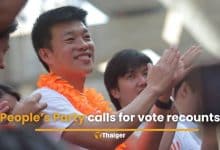Thailand’s opposition wins stunning election victory

Thailand’s opposition celebrated a significant election victory on Sunday after defeating military-allied parties, potentially marking the end of nearly a decade of conservative, army-backed rule. However, despite the liberal Move Forward party and the populist Pheu Thai Party leading with 99% of votes accounted for, it remains uncertain if either will form the next government. Complex parliamentary rules, established after the military’s 2014 coup, pose challenges to the opposition parties.
To assume control, the opposition will need to negotiate deals and secure support from various factions, including junta-appointed Senate members who have historically allied with military parties. These senators will vote on the appointment of the next prime minister and the formation of the upcoming administration.
Sunday’s election symbolizes the latest struggle for power between Pheu Thai, the populist force of the wealthy Shinawatra family, and the combined influence of old money, conservatives, and military factions over significant institutions. The exceptional performance by Move Forward, bolstered by the support of young voters, threatens Thailand’s establishment and ruling parties reports Channel News Asia.
Move Forward emerged as the leading party, followed closely by Pheu Thai, according to preliminary results. Both parties were predicted to win over triple the number of seats held by Palang Pracharat, the junta’s political instrument, and the army-backed United Thai Nation party.
Move Forward leader Pita Limjaroenrat, a 42-year-old former executive of a ride-hailing app, described the remarkable outcome and expressed his commitment to the party’s values. “It will be anti-dictator-backed, military-backed parties, for sure,” he told reporters. “It’s safe to assume that minority government is no longer possible here in Thailand.” He remains open to forming an alliance with Pheu Thai and aims to become the prime minister himself.
This election result serves as a harsh blow to the military and its allied parties. However, their control over parliamentary rules and backing from influential individuals grant them the possibility of playing a role in the new government.
Prime Minister Prayut Chan-o-cha, a retired general who orchestrated the previous coup, called for continuity during the nine years of his rule, arguing that changing the government could lead to conflict. On Sunday, he departed the United Thai Nation party headquarters quietly, with few supporters in attendance.
Although Pheu Thai has achieved the most votes in every election since 2001 – with two landslide victories – three of its four governments have been removed from power. The polarizing, self-exiled entrepreneur Thaksin Shinawatra founded Pheu Thai, which maintains its popularity within the working class. The party hoped to regain power due to the electorate’s nostalgia for its populist policies, such as affordable healthcare, micro-loans, and substantial farming subsidies.
Thaksin’s daughter Paetongtarn, 36, may follow in the footsteps of her father and aunt, Yingluck Shinawatra, to become Thailand’s prime minister. Both Yingluck and Thaksin were overthrown in coups. However, Paetongtarn noted that it was too early to discuss alliances, saying, “The voice of the people is most important.”
Move Forward had experienced a surge in popularity in opinion polls, thanks to the support of 3.3 million first-time voters for its liberal platform. The party seeks to diminish the military’s political role and amend the stringent law on royal defamation, which critics claim suppresses dissent.
Thitinan Pongsudhirak, a political scientist at Chulalongkorn University, believes that Move Forward’s progress signifies a tremendous shift in Thai politics. “Pheu Thai fought the wrong war”, he said. “Move Forward takes the game to the next level with institutional reform. That’s the new battleground in Thai politics.”
Latest Thailand News
Follow The Thaiger on Google News:


























